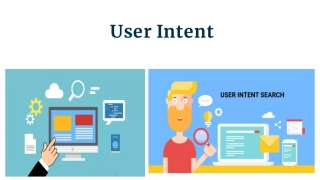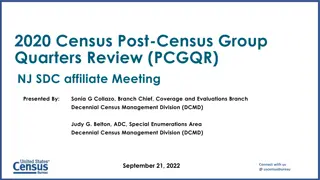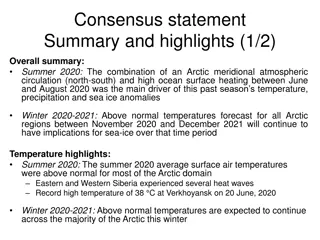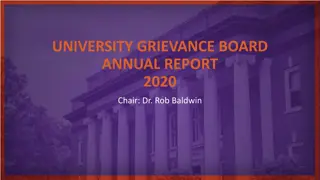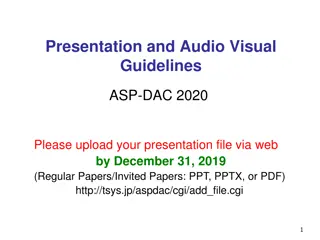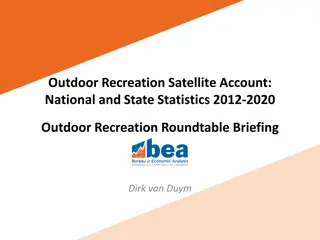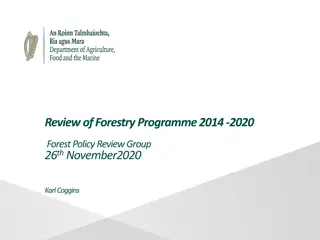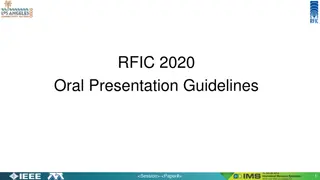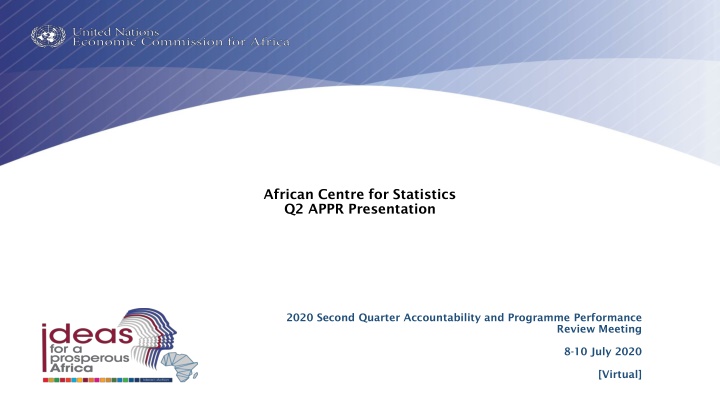
African Centre for Statistics Q2 Programme Performance Review Meeting July 2020
Explore the outcomes of the African Centre for Statistics Q2 Programme Performance Review Meeting held in July 2020. Discussions include strengthening data capacity, enhancing statistical databases, and collaboration efforts amidst the COVID-19 pandemic.
Download Presentation

Please find below an Image/Link to download the presentation.
The content on the website is provided AS IS for your information and personal use only. It may not be sold, licensed, or shared on other websites without obtaining consent from the author. If you encounter any issues during the download, it is possible that the publisher has removed the file from their server.
You are allowed to download the files provided on this website for personal or commercial use, subject to the condition that they are used lawfully. All files are the property of their respective owners.
The content on the website is provided AS IS for your information and personal use only. It may not be sold, licensed, or shared on other websites without obtaining consent from the author.
E N D
Presentation Transcript
African Centre for Statistics Q2 APPR Presentation 2020 Second Quarter Accountability and Programme Performance Review Meeting 8-10 July 2020 [Virtual]
Tinfissi Joseph ILBOUDO Chief Statistical Development, Data Innovation and Outreach Section African Centre for Statistics 2020 Second Quarter Accountability and Programme Performance Review Meeting 8-10 July 2020 [Virtual]
2020 Planned outputs (all budget sources: 18, 11, 23, 35) RA.1 Strengthened capacity of member States to produce, disseminate and use disaggregated data and statistics, with a gender dimension, to facilitate evidence-based policymaking, planning, implementation, monitoring and reporting Performance measures: Increased number of member States that have reduced data gaps for the monitoring and reporting of indicators on the Sustainable Development Goals - Baseline (2019) 10; Target (2020)- 15 ... List of outputs under SP s most significant result (TT)Technical assistance and advisory services on Census preparation provided to Kenya, Namibia and Ghana [ES-Compact EA.2.3 and PM.2.3.1] (Convening): Increased synergy and collaboration amongst key partners (ECA, AfDB, AFRISTAT and PARIS21) on ongoing initiatives in support of NSSs during COVID-19 pandemic
2020 Planned outputs (all budget sources: 18, 11, 23, 35) RA.2. Improved availability of harmonized statistics in ECA databases and enhanced support for member States in their efforts to produce and disseminate comparable data and statistics Performance measures: Increased number of member States with at least one data point for 50 per cent of a regional set of indicators for the 2030 Agenda for Sustainable Development and Agenda 2063 that exist in the ECA databases; Baseline 2019: 10 ; Target (for 2020): 20 ; List of outputs under SP s most significant result (Convening) SDG Portal and revamping of ECAStats to cater for variety of data sources and store for use by policy makers https://ecastats.uneca.org/data/sdgsafrica.aspx; [ES Compact EA.1.1 and PM.1.1.5] Price Watch Center on consumer price indices for households (CPI):https://ecastats.uneca.org/pricewatch/; [ES-Compact EA.1.1 and PM.1.1.4]
HOW? Delivery modalities for outputs of RA1and RA2 Joint delivery with other SPs & external partners (AUC, UN and others) AUC (ASCC) AfDB; PARIS21; AFRISTAT UN-Agencies GPSDD Alignment with ECA s strategic directions Countries of Focus (pick the relevant ECA SD icon) RA1: Kenya, Namibia and Ghana RA2: All African countries Gender Mainstreaming Contribution to the SDGs OIBCs (if applicable) (All SDGs will be impacted from the statistical training) OIBC-1: Strengthened integrated data and statistical systems for sustainable development: list of flagship initiatives (3). [ES-Compact EA.1.1 and PM.1.1.5] Technical support to the partnership Data2X, ECA project on improving the production and use of gender data within National Statistics Systems
Status update: Outputs delivered in Q2 (COVID related outputs) THINK-TANK ASSESSMENT OF THE IMPACT OF THE COVID-19 PANDEMIC ON AFRICA NSO OPERATIONS [ES-Compact EA.1.1 and PM.1.1.4] CONVENING Decisions of the first and second teleconferences call with the Directors General of National Statistical Offices on mitigations measures within NSSs on COVID-19 impact on statistical systems in Africa [ES-Compact EA.1.1 and PM.1.1.4] OPERATIONAL African Statistical System collaborative platform launched in June: https://ecastats.uneca.org/khub/en-us/ [ES-Compact EA.5.2 and PM.5.2.1] ECA Price Watch Centre: https://ecastats.uneca.org/pricewatch/; [ES-Compact EA.1.1 and PM.1.1.4]
Status update: Risks and mitigations Mitigation strategies Risks COVID-19 impact on national statistical systems: the health and life of their staff. Limitation of field data collection. Several data collection operations have been halted or postponed, A rapid assessment on COVID-19 impacts on NSSs in Africa. African Statistical System collaborative platform: launched on 5 June 2020. Vitalization of exchanges between DGs of NSO: WhatsApp group of DGs Links to Global Statistical System: CCSA and global periodic survey on COVID-19 impact on NSSs Focus on COVID-19 and its implication on ECA s core functions
Data and statistics Emmanueal Ngok Economic, Infrastructure and Agriculture Statistics Section African Centre for Statistics 2020 Second Quarter Accountability and Programme Performance Review Meeting 8 10 July 2020 [Virtual]
2020 Progress on achievements (all budget sources: 18, 23, 11, 35) Objective: To improve the production, dissemination and use of quality data and statistics within the framework of the 2030 Agenda for Sustainable Development and Agenda 2063 in order to support economic and social development in Africa Result Area 1: Strengthened capacity of member States to produce, disseminate and use disaggregated data and statistics, with a gender dimension, to facilitate evidence-based policymaking, planning, implementation, monitoring and reporting Progress made to achieving the result area Increased number of member States that have adopted and applied the SNA 2008 including environmental economic accounting (SEEA) (13/5/ ) Baseline (2019) 13; Target (2020) 5; Actual (2020) 5 The progress made: In response to the requests of member States, a capacity-building programme on Consumer Price Index (CPI) data collection methodology and techniques was launched in May 2020, comprising regional seminar, guidance notes, technical assistance, and expert group meeting. Continuing and advancing the project of developing statistical capacity in Africa for integration into the Trade in Value Added (TiVA) database, consisting of e-training, regional seminars, and national workshops. Developed and launched the Price Watch Center on consumer price indices (CPI), a portal updated monthly.
HOW? Delivery modalities RA1 Joint delivery in Countries of Focus Alignment with ECA s strategic directions Target countries (pick the relevant ECA SD icon) Continuing partnership with WTO and OECD on formulating a technical assistance project to support African countries in the production of TiVA database and indicators Continuing GDP Rebasing programme for the year will include technical assistance and advisory services to countries to compile new base year of National Accounts For GDP Rebasing programme: Benin, Republic of the Congo, Democratic Republic of the Congo, Sudan The Gambia, and Zambia. For TiVA project: Eswatini, Seychelles, Zambia, Cameroon, Cote d Ivoire, Egypt, Nigeria, and Senegal Response to COVID-19 A Regional Seminar via teleconference on Data Collection for Compilation of CPI in Combat with Covid-19 was organized in the weeks of 18-28 May 2020. 432 participants from 51 member States and 29 agencies and institutions registered in this online regional seminar. Guidance Note produced. Seminar website for materials: https://ecastats.uneca.org/acsweb/FocusAreas/ESNA/CPI2020.aspx
HOW? Delivery modalities - RA1 Contribution to the SDGs Partnerships (external) Follow-up on ARFSD res. AFRISTAT, ILO, IMF, INSEE, Statistics Norway, Statistics South Africa, UK ONS, UNECE, UNSD, and U of Michigan on CPI Data Collection AUC and RECs on CPI OECD and WTO on TiVA WB on SUTs and TiVA Improve quality and coverage of economic and environment statistics in member countries to facilitate reporting on Sustainable Development Goals and the Africa 2063 agenda. (pick the relevant SDGs icon, as applies) Economic and environmental targets Gender Mainstreaming OIBCs (if applicable) Gender is mainstreamed in economic and environmental policy and management OIBC-1: Economic and Environment Statistics (UNECA/UNFPA)
Status update: Key challenges and lessons learnt RA1 Lessons learnt Key challenges Due to COVID-19, technical assistance missions are suspended, and the timeline of the related projects may be delayed. Lack of complete and timely data provided by all the African countries will affect the quality of the related databases built for the Continent. Shortage of human, financial, and technical resources limit the extent that we can commit ourselves to the requests. Make use of tele-communication means and technology to dialogue and support the work of the country teams in the field. Providing technical support and advice to build up the technical capacity and to enable them to carry out the related activities. Identify the priority areas and balance the trade- off between various tasks and activities.
William Muhawva Chief, Demographic and Social Statistics Section African Centre for Statistics 2020 Second Quarter Accountability and Programme Performance Review Meeting 8 10 July 2020 [Virtual]
2020 Progress on achievements (all budget sources: 18, 23, 11, 35) Objective: To improve the production, dissemination and use of quality data and statistics in the framework of the 2030 Agenda and Agenda 2063 in or der to support economic and social development in Africa. Result Area 1:Strengthened capacity of member States to produce, disseminate and use disaggregated data and statistics, with a gender dimension, to facilitate evidence- based policymaking, planning, implementation, monitoring and reporting Progress made to achieving the result area IoA: Increased number of member States that are producing vital statistics based on a civil registration system Baseline (2019) 10 and Target (2020) 15 o Needs assessment undertaken in 10 countries on the United Nations Legal Identity Agenda (Kenya, Sierra Leone, Liberia, Cameroon, DRC, Zambia, Mozambique, Cote d Ivoire, Nigeria and Niger) o Technical assistance in CRVS Systems strengthening in 7 countries (Ethiopia, Senegal, Burkina Faso, DRC, Somalia, Sudan and South Sudan) o Mentoring NSOs in the analyses of vital statistics and the production of the reports (Rwanda and Tanzania) o Supporting the activities for undertaking digital censuses in Ghana, Namibia, Sierra Leone, Mauritius and Seychelles o Improving the production and use of gender data by National Statistics Systems through the Gender Data Network
HOW? Delivery modalities RA1 Joint delivery in Countries of Focus Alignment with ECA s strategic directions CRVS Target countries Mauritania; Sudan; Ghana; Mali; Burkina Faso; C te d'Ivoire; Guinea; Liberia; Togo; Niger; Cameroon; Chad; Congo; Ethiopia; Kenya; Rwanda; Eritrea; Seychelles; South Africa; Malawi; Zambia; Namibia and Zimbabwe. UN LIA in collaboration with SROs W.A.-Sierra Leone, Liberia C.A. DRC, Cameroon E.A.-Ethiopia, Kenya S.A.-Zambia, Gender Statistics in collaboration with GPSPD (pick the relevant ECA SD icon) Response to COVID-19 Rapid Impact Assessment of Covid-19 Pandemic on CR Operations Technical Note on Maintaining Civil Registration and Vital Statistics during the COVID-19 pandemic Webinars on mitigating the impact of pandemic on CR Operations Innovations adaptable for business continuity: E-Notifications Lessons learnt from the European, Asia and Pacific Regions on CRVS on business continuity during the COVID-19 pandemic.
HOW? Delivery modalities - RA1 Contribution to the SDGs Partnerships (external) Follow-up on ARFSD res. (pick the relevant SDGs icon, as applies) UNFPA and UNSD on censuses UNICEF on CRVS UNICEF, UNDP and UNDESA on legal identity Data2X and UNWOMEN AUC on CRVS ONS UK on censuses, CRVS and gender statistics Improve quality and coverage of demographic and social statistics in member countries to facilitate reporting on Sustainable Development Goals and the Africa 2063 agenda. Report on population-related SDGs. SDG 16.9 SDG Target 17.19 CRVS measures two-thirds of the SDG indicators Gender Mainstreaming OIBCs (if applicable) Gender is mainstreamed in CRVS and Legal Identity Management Producing gender disaggregated data in surveys, censuses, administrative data. OIBC-1: Demographic and Social Statistics (UNECA/UNFPA) OIBC-4 Digitalizing legal identities
Status update: Key challenges and lessons learnt RA1 Lessons learnt Key challenges Impact of the COVID-19 Outbreak on Censuses, Civil Registration, Social and Gender Statistics - that has reduced the operational capabilities for holding meetings and training workshops that require practical and field observations. Countries undertaking digital censuses will be able to secure the required devices Some of the meeting are being conducted through teleconferences ECA is sourcing for devices that will be used to establish a tablet-sharing programme that will ensure appropriate IT infrastructures, equipment and software are available to countries on a loan basis
SP4 | Data & Statistics Andre Nonguierma Chief, African Centre for Statistics | GiMS 2020 Second Quarter Accountability and Programme Performance Review Meeting 8 10 July 2020 [Virtual]
2020 Progress on Achievements | All Budget Sources |18, 23, 11, 35 Objective: To improve the production, dissemination and use of quality data and statistics in Africa Result Area 3 : Enhanced capacity of member States to produce and use timely geospatial data, information and services for evidence-based decision-making in Africa Progress Made to Achieving the Result Area IoA 1 | Increased number of member States developing policies and strategies for the integration of statistical and geospatial information | Baseline (2019): 5 | Target (for 2020): 5 | Actual (2020): 1 IoA 2 | Increased number of member States developing and making available to users fundamental geospatial data sets, online applications and services | Baseline (2019): 5 | Target (for 2020): 5 | Actual (2020): 2 | C te d'Ivoire, Ghana Completion of the policy guidelines for the establishment of spatial data infrastructures.. Production of a manual on standard guiding principles on the integration of geospatial and statistical information in Africa Fellowship research study on Usefulness of spatial measurement in monitoring of the SDG indicators Organization of one regional Workshop on setting up geospatial policies for Western Africa. Organization of one regional capacity building workshops for Northern Africa countries.
HOW? |Delivery Modalities | RA3 Joint delivery in Countries of Focus Alignment with ECA s strategic directions Target countries WA | Burkina Faso, C te d Ivoire, Togo CA | Cameroon, Congo EA | Ethiopia, Uganda, Comoros SA | Zambia The Geospatial information production and integration focuses on Burkina Faso, Cameroon, C te d Ivoire, DRC, Togo, Uganda, Zambia. Support and assistance to Sub-Programmes and SROs in joint delivery to countries OES, PSDFD, SDPD, TCND | Support for development of databases, Production of maps and other GIS-related services. SRO-CA | Work on spatial planning of central Africa transport corridors C te d Ivoire | for West Africa. (pick the relevant ECA SD icon) Response to COVID-19 Building an African Dashboard to tracks the status of COVID-19 in real time. https://arcg.is/5LCSa Assessing COVID-19 impact on geospatial activities in Africa and NMS readiness Organizing a Virtual Seminar with National Mapping Agencies to define strategies on geospatial response to the Coronavirus outbreak.
HOW? Delivery modalities - RA1 Contribution to the SDGs Partnerships (external) Follow-up on ARFSD res. The Section collaborates and coordinates its activities with other agencies in UN system, with international and regional associations and programmes, and other partners UNSD|To develop IGIF and implementing UN-GGIM AUC | Alignment and conjoining training for the GMES Africa Programme UNOOSA | Capacity Building through the UN-Spider Programme. Partnering and Contributing to various regional initiatives | Digital Earth Africa, GEO,.. Building an African Dashboard that tracks the status of COVID-19 in real time. https://arcg.is/5LCSa Development of spatial data taxonomy and matrix identifying the geospatial datasets requirements for the monitoring and implementation of the SDGs in Africa. Completion of the first release of the online application with the creation of the enterprise geodatabase. It s expected that this master geodatabase will ingest the spatial data being collected with Member States through in- country missions. (pick the relevant SDGs icon, as applies) The integration of geospatial and statistical data is crucial for many of the environmental indicators (SDGs 13, 14, 15), as well as for the disaggregated analysis of socioeconomic indicators s (SDGs 1, 2, 3, 4, 9, 11). Gender Mainstreaming OIBCs (if applicable) Organization of capacity building workshops to improve countries capacity in the production of geospatial information, with particular emphasis on the empowerment of young female geospatial professionals OIBC 1 Strengthening integrated data and statistics. Guidelines on spatial data taxonomy and matrix identifying the geospatial datasets for the SDGs Manual on standard guiding principles on the integration of geospatial and statistical information in Africa.
RA3 | Status Update | Key Challenges and Lessons Learnt Lessons learnt Key challenges One of the key lesson learned over the period is that the impact of the COVID-19 Outbreak has disadvantaged the operational capabilities of African National Mapping Agencies Additional data demand/pressure Financial impact on mapping budgets and expenditures Possible supports from ECA on mitigating the impact of COVID-19 on geospatial information management include: Continued engagement with Member States through virtual meetings and seminars Support to enable countries build geoportals using Esri Africa Geoportal platform and resources Development of an Africa holistic programme on Geospatial Responses to COVID-19 that informs on ideas, insights and strategies avenues (cooperative management of development information, frameworks for financial appropriation, partnership, etc.).
Status of Budget Utilization & Implementation Status update on the SP s budget utilization / implementation Presentation at divisional level on the status of : RB, XB, RPTC
Status Update on Implementing Partners Provide status update on the SP s implementing partners for XB funded projects N/A
Digital Center for Excellence Ibrahim Mamma PMO, Africa Center for Statistics 2020 Second Quarter Accountability and Programme Performance Review Meeting 8 10 July 2020 [Virtual]
2020 Progress on achievements (all budget sources: 18, 23, 11, 35) Objective: Strengthen the implementation of the Good Digital ID framework Principles as enabling factors for digital transformation, inclusive growth and development Result Area 1: The implementation of Digital Identity is further augmented by the advancement of regional and national Digital Transformation Strategies and Programmes Progress made to achieving the result area Member States supported to design and implement digital transformation strategy and Good Digital ID framework principles: (Baseline 2019 - 0 / Target 2020 5 Actual 2020 at Q2 - 23) Meeting of African Ministers of Finance on the impacts of COVID-19 on 1st April 2020 in which ECA was requested to assist Member States to respond to the socio-economic impact of the pandemic. Africa Communication and Information Platform (ACIP) for Health and Economic Action to serve as a two-way information and communication platform between citizens and government. Major mobile network operators and partners on the continent including MTN, Vodacom, Airtel, EthioTelecom, Safaricom and Orange, ITU Support to country s National COVID-19 Taskforce, Ministry of Health, and Ministry of Finance, Economy, and Planning, and international development organizations, including Africa CDC and ECA Currently operational in 23 countries and at various stages
2020 Progress on achievements (all budget sources: 18, 23, 11, 35) Objective: Strengthen the implementation of the Good Digital ID framework Principles as enabling factors for digital transformation, inclusive growth and development Result Area 2: Regional interoperability and trust frameworks are developed and in place for enabling the effective implementation of Digital ID and Digital Economy in countries and the continent Progress made to achieving the result area Member States supported to design and implement digital transformation strategy and Good Digital ID framework principles: (Baseline 2019 - 0 / Target 2020 5 Actual 2020 at Q2 - ) Interoperability Framework for Digital Identity Developed and included in the African Digital Transformation Strategy Pan African Trust Framework PATF developed Partnership with Smart Africa for the design and implementation of Good Digital ID Blue Print Publication finalized on Leveraging the power of Digital ID ; including impacts of COVID-19 An exchange platform for policy and decision makers on the implementation of Digital Identity
HOW? Delivery modalities RA1 Joint delivery in Countries of Focus Alignment with ECA s strategic directions Target countries On Digital Trade and Economy, the center is working with RITD, TCND and ATPC as well as SRO- EA, SRO-CA On Digital ID and inclusivity , the center is working with Social Development Policy Division (SDPD) and SRO- SA On the ACIP COVID response, All SROs and Divisions have involved actively. (pick the relevant ECA SD icon) NA: Egypt and Tunisia CA: Congo-Brazaville and Cameroon WA: Cote d Ivoire, Guinee, Togo, Ghana, Senegal, Nigeria, Benin EA: Burundi, Comoroes, Ethiopia, Rwanda, Uganda, Kenya, Seychelles, DRC SA: Botswana, Zimbabwe, South Africa, Zambia Response to COVID-19 Africa Communication and Information Platform (ACIP) Publication on leveraging the power of Digital ID for the combat against COVID -19
HOW? Delivery modalities - RA1 Contribution to the SDGs Partnerships (external) Follow-up on ARFSD res. Mobile Network Operators- MTN, Vodacom, Airtel, EthioTelecom, Safaricom and Orange AU-CDC, ITU GPSDDon Data4Now initiative on Digitalization of Data production and management Future States for Policy Exchange platform Advancing digitalization for availing data supporting reporting to the various SDGs. (pick the relevant SDGs icon, as applies) Indicate contributions to specific target(s) Gender Mainstreaming OIBCs (if applicable) Inclusivity on Digital Identity focuses on ensuring the registration of women and access to identification On Digital Economy, Trade and Payment systems, the focus is in ensuring women owned businesses are provided special emphasis Strength Data through ACIP
Status update: Key challenges and lessons learnt RA1&2 Lessons learnt Key challenges Original direct technical support planned for member States to implement Digital ID principles and structures delayed The need for Digital Identity and validation technologies have gained further momentum as a result of the Pandemic National Dialogues and diagnosis planned for developing respective National Digital transformation Strategies have been constrained. Digitalization as whole has gained more impetus as a result of the need to ensure business continuity in public service using technology.
Status of budget utilization/implementation Provide status update on the SP s budget utilization/implementation by budget source (all budget sources: RB, XB, RPTC, DA) Budget Source- Omidyar Network 201819- An allocation of USD 1.2 million 2020- A new allocation of 1.45 Million (USD 800,000 already received)
Status update on implementing partners Provide status update on the SP s implementing partners for XB funded projects Omidyar network for Digital Identity, interoperability and digital transformation Sprinklr, Africa-CDC on the Africa Communication and Information Platform (ACIP) for Health and Economic Action

